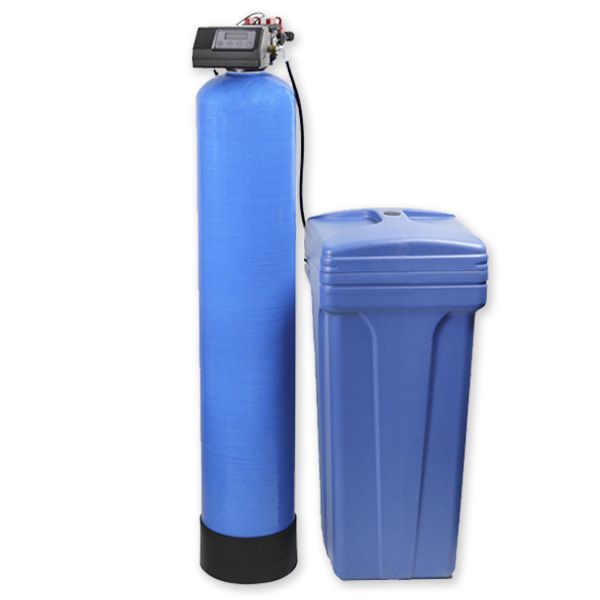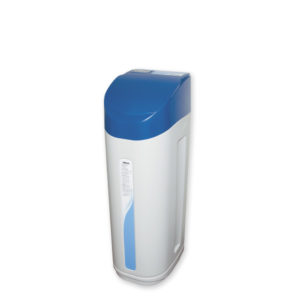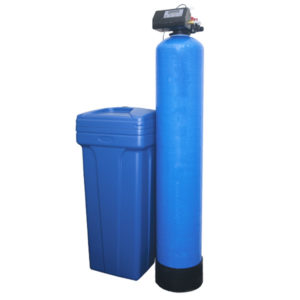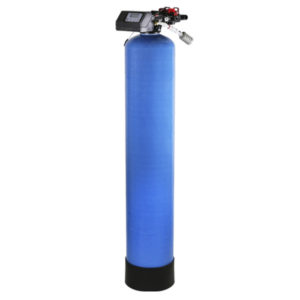Water Softener – Two Tank style

Soft water for your entire home !
- Two tank system with separate salt tank
- Demand initiated regeneration
- Unique bilingual electronic display
- 360° rotatable connections for easy hook-up
- 30,000 to 90,000 grain models
- Certified to NSF/ANSI44 & CSA B483.1
- 10 year limited warranty
-
Click to buy online or in store at:
30,000 Grain (Model 30T) 45,000 Grain (Model 45T) 60,000 Grain (Model 60T) 


In-store special order 



Also available in store at the following retailers:

Not all models are available at all locations/retailers. If you questions regarding availability of a particular model, please call your local store or Rainfresh support.
-
What is hard water ? Simply put, water that contains high concentrations of calcium and magnesium compounds is called hard water . When hard water comes in contact with heat (as in a water heater or a kettle), these compounds form a thick scale that reduces the efficiency of water heaters and increases energy costs. Hard water does not form lather easily and requires more detergent or soap than soft water. With soap, hard water forms soap curd or scum that makes skin dry and itchy, hair lifeless, laundry dull and builds up on shower heads, faucets, sinks etc.
Rainfresh two tank water softeners make water soft by removing hardness using a process called Ion Exchange. Hardness-causing calcium and magnesium ions are replaced by an equivalent number of sodium ions. Sodium ions do not form scale, thus making the water soft, while maintaining it’s chemical balance.
By installing a Rainfresh 2-Tank water softener, your laundry come out cleaner and softer, you get spotless glasses and dishes from your dishwasher, enjoy softer bouncier hair and smoother skin after showers and prevent scale build up in your bathroom and water heater. With Rainfresh water softeners you will enjoy soft water for years to come!
Rainfresh two tank water softeners have a separate salt (brine) tank which makes salt-filling much easier. They are also easier to service due to easier access to the control valve. Also, cabinet water softeners have size limitations and are not suitable for large homes or homes with extremely hard water . Two tank water softeners are available from 30,000 grains to 90,000 grains.
BENEFITS
Laundry
- Clothes washed in soft water come out softer and prevent damage to fibres
- With soft water you will use up to 75% less detergent than hard water, saving you money
- Whites come out whiter
- Extends your washing machine life by preventing scale build up
Shower and Shave
- Enjoy softer, bouncier hair & smoother skin after showers
- Prevents shower heads from clogging up due to scale
- Smoother and closer shaves & razors last longer
- Use up to 75% less shampoo and conditioners – saves you $$
Dishwasher
- Spotless glassware and dishes
- No need for expensive dishwasher detergents
- Use up to 75% less detergent – saves you $$
Water Heater
- Reduces energy costs by preventing scale build up in water heaters
FEATURES
- Demand Initiated regeneration – Automatically calculates volume of water it can soften and regenerates only when necessary. Consumes up to 60% less salt than timer softeners
- Salt saving technology – Salt usage can be changed based on water quality
- High hardness removal – up to 65 GPG
- Top of the line electronic controls for high efficiency and ease of use
- Electronic controls with bilingual (English & French) display
- Easily programmable with a touch of the button (cycle time, backwash frequency etc.)
- 360 degree rotatable connector fittings makes installation easy as they can be easily rotated to suit any installation angle or pipe direction. Also reduces cost of extra plumbing fittings
- ¾” NPT elbow or straight fittings
- Compact design – can be fit into tight spaces
- Full flow bypass valve standard
- Separate salt tank for easy salt loading. Salt tank can be moved around for easy access in tight places
- Easy access to control valve compared to cabinet style units
INSTALLATION
- Installs on main water line before water pipe divides into hot and cold
- Requires air-gap drain connection or drain run can be run to a laundry tub
- Bypass valve included
- 15 ft of drain hose included
- 120V AC power required (consumes only about 8W power)
SALT USE
- Softener salt (sold at most retailers) is consumed in the cleaning/regeneration cycle (It does not go into the water). Nugget or pellet softener salt only recommended. Potassium salt can also be used.
TESTING AND CERTIFICATION
- Tested & certified by The Water Quality Association to CSA B483.1 & to NSF/ANSI 44
WARRANTY
- 10 year limited warranty
# of Bathrooms in home Model Max Capacity (Grains)~ Resin (Cu Ft.) Max Hardness Removal Installed Dimensions (HXWXD) Salt Tank Dimensions (HxWXD) Shipping Weight (Lbs) Up to 3.5 30T 30000 1.0 50 GPG 54”x10”x13.5” 35” x 15”x 15” 104 Up to 5 45T 45000 1.5 65 GPG 60”x11”x13.5” 35” x 15”x 15” 134 Over 5 60T 60000 2.0 100 GPG 58”x13”x13.5” 35” x 15”x 15” 164 -
Download spec sheet (PDF):
- T Series Softeners 2022 English
Download product manual (PDF):
- T Series Water Softener Manual English
- T Series Water Softener Manual French
-
FREQUENTLY ASKED QUESTIONS
1) How will a Rainfresh “T” series Softener make my water better?
Rainfresh softeners remove water hardness. Hard water forms white scaly deposits on shower heads and bathtubs, washing machines, faucets, water heaters and causes spotty dishes from dishwashers. Moreover hard water does not form lather easily, leading to excessive consumption of soaps, shampoos and detergents.
By installing a Rainfresh softener, you will get soft water in the entire house, both hot and cold water.
- Prevents showerheads from clogging up due to scale
- Spotless glassware and dishes
- Enjoy softer, bouncier hair & smoother skin after showers
- Smoother and closer shaves & razors last longer
- Clothes washed in soft water come out softer and prevent damage to fibres – Whites come out whiter
- With soft water you will use up to 75% less detergent than hard water, saving you money.
- Adds years to the life of water-using appliances such as dishwasher, water heater, humidifier, washing machine, etc.
- Reduces energy costs by preventing scale build up in water heaters
2) What are the advantages of the “T” Series 2-tank softeners over cabinet style softeners?
- 2-tank unit has more resin media than similar rated cabinet softener. They can thus handle higher flow rates compared to cabinet softeners
- The separate salt tank can be easily cleaned or even replaced in case of Salt Bridging. (Bridging is common and caused by high humidity and/or overfilling the salt tank or impure salt that causes salt crystals to attach to each other leaving an empty air space between the water and the salt. When this happens, the softener cannot regenerate, and thus does not work).
- 2-tank units can be easily serviced as controls are easily accessible
- Cabinet models are generally not available in higher capacity models
3) What does Grain capacity of a water softener mean?
Water hardness is measured in a unit called “Grains per Gallon”. The grains capacity refers to the number of grains of hardness that the unit will remove before it needs to recharge. If your water has a hardness of 10 grains per gallon and your softener has a capacity of 30,000 grains, it means that the unit will recharge in 30,000/10 = 3,000 US Gal. This is a theoretical capacity and actual capacities are slightly lower.
4) How do I know how hard my water is?
If you use municipally treated water, you can call your local water authority and find out your water hardness. For private water supplies, you can get your water tested free by sending a water sample to Rainfresh water test lab. Check your store for details
5) Where do I install the Rainfresh Softener?
For municipally treated waters, the ideal location is just after the water meter, before the plumbing line divides into hot and cold. For well/lake water, the ideal location is after the pressure tank before line divides into hot and cold.
6) How can I easily install the softener?
You can buy (or order) the Rainfresh CKS solder-less connector kit that does not require you to solder pipes. It can also be used on PEX and CPVC pipes and is extremely easy to use. Of course, you can plumb in the unit as well, following local codes and regulations.
7) What do I need to do after the softener is installed?
The only thing you need to do is to add softener salt. Check the salt level every month and add more if necessary. There’s nothing else you need to do.
8) Why does the Rainfresh softener need to recharge?
The softener has a certain capacity of hardness removal. At some stage this capacity is exhausted and the unit needs to dump the hardness down the drain and recharge itself. This is done automatically using the electronic computer valve built into the unit. The interval between regenerations depends on your water hardness and the amount of water you consume every day.
9) Does the Rainfresh Softener recharge based on time or water usage?
Rainfresh softeners are high efficiency and recharges only when necessary, which is based on water usage. Once the input hardness is set, the computer automatically senses the amount of water that is being used and the frequency of regeneration.
10) How much water does each recharge use?
The default settings use as much water as a load of laundry.
11) What kind of salt should I use?
A clean pellet or nugget style salt is recommended. Do not use road salt or any other type of salt.
12) How many bags of salt will I go through every year?
Based on a family of 4, table below gives an approximate number of salt bags (20 Kg) you will use per year
Water Hardness RAINFRESH MODEL 30T 45T 60T 5 4.8 3.3 2.6 10 9.5 6.4 4.9 15 14.1 9.5 7.3 20 18.8 12.6 9.6 25 23.5 15.8 11.9 30 28.1 18.9 14.3 35 32.8 22 16.6 13) Can I use Potassium Salt with the Rainfresh unit?
Yes you can use Potassium salt with the Rainfresh unit, but you will need to make some programming changes to the unit. Call Rainfresh for details.
14) Will I drink all the salt that I put in the unit?
It is a common misconception that the salt goes into the water. Salt is only used to recharge the softener resin with sodium after the resin capacity has been exhausted. Following this salt-recharge, the softener undergoes a rinse cycle during which any left-over salt is discharged to drain. However, soft water does have higher levels of sodium and thus not recommended for people on sodium restricted diets.
15) Will this unit harm a septic system?
Many industry studies have concluded that softeners do not have adverse effects on septic systems. For more information, you may call the Canadian Water Quality Association.
16) How much electricity does the Rainfresh Softener use?
Very little, as much as a digital alarm clock
17) What is the warranty on Rainfresh softeners?
Limited 5 year warranty with a 10 year warranty on the mineral tank. Call Rainfresh for details
Have more questions? Enter you own question below and our customer service will get back to you within 24 hours.
-
To buy parts online visit Rainfresh webstore :
-
45000 grain water softener 2 tank style from Rainfresh features a 2-tank style with a separate brine tank. What is hard water ? Simply put, water that contains high concentrations of calcium and magnesium compounds is called hard water . When hard water comes in contact with heat (as in a water heater or a kettle), these compounds form a thick scale that reduces the efficiency of water heaters and increases energy costs. Hard water does not form lather easily and requires more detergent or soap than soft water. With soap, hard water forms soap curd or scum that makes skin dry and itchy, hair lifeless, laundry dull and builds up on shower heads, faucets, sinks etc.
Rainfresh 45000 grain water softener 2 tank style make water soft by removing hardness using a process called Ion Exchange. Hardness-causing calcium and magnesium ions are replaced by an equivalent number of sodium ions. Sodium ions do not form scale, thus making the water soft, while maintaining it’s chemical balance.
By installing a 45000 grain water softener 2 tank style, your laundry come out cleaner and softer, you get spotless glasses and dishes from your dishwasher, enjoy softer bouncier hair and smoother skin after showers and prevent scale build up in your bathroom and water heater. With Rainfresh water softeners you will enjoy soft water for years to come!
Rainfresh 45000 grain water softener has a separate salt (brine) tank which makes salt-filling much easier. They are also easier to service due to easier access to the control valve. Also, cabinet water softeners have size limitations and are not suitable for large homes or homes with extremely hard water . Two tank water softeners are also available from 30,000 grains to 90,000 grains. What’s more, Rainfresh 2 tank water softeners feature top quality materials and max resin volume for the high capacity and long life.
-
Reviews
Add a review Cancel reply






After moving to an acreage with a hard water well about one year ago,, I did a significant amount of research into water softeners. Bought a Model 30T and it immediately changed the quality of the water. Since the house was eight years old, I also cleaned the inside of the hot water tank with vinegar so that the soft water would not dissolve the minerals and carry them through the system. The system uses a bag of salt about every six weeks and otherwise has been maintenance free. I had some questions during the install and customer service was excellent.
After talking today with Blair in tech support we have gone ahead and purchased a residential water softener and UV system for our home. Blair’s friendly and knowledgeable attitude was the deciding factor. Thank you for your support services.
Sincerely
Don Schiedel
Exactly what we were looking for
Bought this softener a couple of months ago and we couldn’t be happier. The only reason I didn’t give it 5 stars is that we’ve only had it a month and aren’t yet able to give an opinion on its longevity and durability. That said, we were looking for a product that would be stingy on salt usage and easy to program. This softened delivered in spades.
Creaturesall
Langdon, AB, Canada
Perfect for our home! Great Product
Bought this unit last fall to replace an old Erie unit we had at our house for many years. This unit uses less than a 1/4 of the salt compared to the old unit. The display is electronic and easy to program. Installation was very easy. Very happy and satisfied with the unit. Just buying another one for my parents’ cottage !
Great unit. We bought in Alberta cause the water was so hard you couldn’t lather up soap. The unit is so effiecient we put salt in every 4 to 5 months. After its super easy installation we had it up and running in under two hours. Too bad we had to sell the house with it. We plan on buying another unit as soon as we move into our new house.